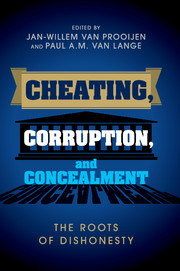
-
Select format
-
- Publisher:
- Cambridge University Press
- Publication date:
- 05 June 2016
- 30 June 2016
- ISBN:
- 9781316225608
- 9781107105393
- 9781107512627
- Dimensions:
- (228 x 152 mm)
- Weight & Pages:
- 0.6kg, 330 Pages
- Dimensions:
- (229 x 152 mm)
- Weight & Pages:
- 0.5kg, 330 Pages
- Subjects:
- Social Psychology, Political Sociology, Psychology, Sociology
You may already have access via personal or institutional login- Subjects:
- Social Psychology, Political Sociology, Psychology, Sociology
Book description
Dishonesty is ubiquitous in our world. The news is frequently filled with high-profile cases of corporate fraud, large-scale corruption, lying politicians, and the hypocrisy of public figures. On a smaller scale, ordinary people often cheat, lie, misreport their taxes, and mislead others in their daily life. Despite such prevalence of cheating, corruption, and concealment, people typically consider themselves to be honest, and often believe themselves to be more moral than most others. This book aims to resolve this paradox by addressing the question of why people are dishonest all too often. What motivates dishonesty, and how are people able to perceive themselves as moral despite their dishonest behaviour? What personality and interpersonal factors make dishonesty more likely? And what can be done to recognise and reduce dishonesty? This is a fascinating overview of state-of-the-art research on dishonesty, with prominent scholars offering their views to clarify the roots of dishonesty.
Contents
Metrics
Altmetric attention score
Full text views
Full text views help Loading metrics...
Loading metrics...
* Views captured on Cambridge Core between #date#. This data will be updated every 24 hours.
Usage data cannot currently be displayed.
Accessibility standard: Unknown
Why this information is here
This section outlines the accessibility features of this content - including support for screen readers, full keyboard navigation and high-contrast display options. This may not be relevant for you.
Accessibility Information
Accessibility compliance for the PDF of this book is currently unknown and may be updated in the future.


